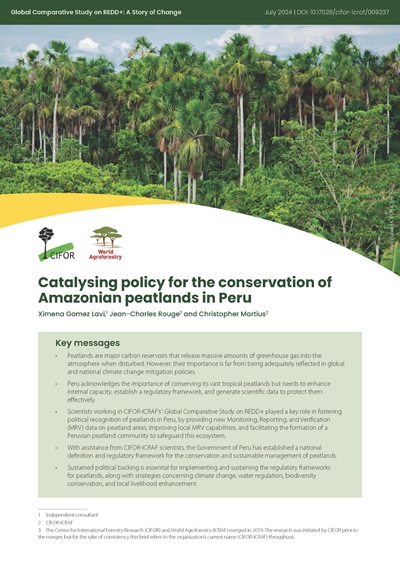Key messages
- Peatlands are major carbon reservoirs that release massive amounts of greenhouse gas into the atmosphere when disturbed. However, their importance is far from being adequately reflected in global and national climate change mitigation policies.
- Peru acknowledges the importance of conserving its vast tropical peatlands but needs to enhance internal capacity, establish a regulatory framework, and generate scientific data to protect them effectively.
- GCS REDD+ scientists working in CIFOR’s Global Comparative Study on REDD+ played a key role in fostering political recognition of peatlands in Peru, by providing new Monitoring, Reporting, and Verification (MRV) data on peatland areas, improving local MRV capabilities, and facilitating the formation of a Peruvian peatland community to safeguard this ecosystem.
- With assistance from CIFOR scientists, the Government of Peru has established a national definition and regulatory framework for the conservation and sustainable management of peatlands.
- Sustained political backing is essential for implementing and sustaining the regulatory frameworks for peatlands, along with strategies concerning climate change, water regulation, biodiversity conservation, and local livelihood enhancement.
DOI:
https://doi.org/10.17528/cifor-icraf/009237Score Altmetric:
Dimensions Nombre de citations:
Année de publication
2024
Auteurs
Gomez Lavi, X.; Rouge, J-C.; Martius, C.
Langue
English
Mots clés
policy analysis, conservation, peatlands, evaluation, monitoring, impact assessment, national planning
Géographique
Peru

















